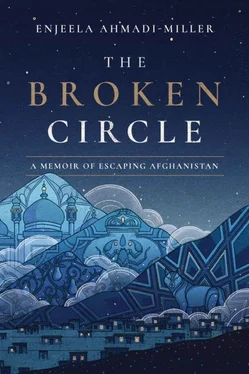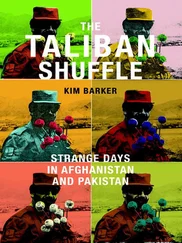It was an old bus, brightly painted and jammed with riders. It was apparent we were in Pakistan from the dress of the passengers. The Pakistanis we saw were darker skinned, like Indians, and wore traditional clothes: the men wore shalwar kameez and jinnah caps, and the women wore dupattas and shalwar kameez also. Most Afghan men wore Western dress, jeans and sport shirts, and women, scarves over long tunics. After I found a seat, I finished drinking my ice-cold soda slowly, enjoying its coldness.
The bus wound through Peshawar’s noisy streets, picking up and dropping off, until it made its way outside the city limits and crossed into a dusty refugee camp. We stared at the clusters of tents and the dirt streets, each filled with Afghan refugees, mostly women and children. We had all been forced out of our country by war; orphaned by our country, forced to live on the road, in camps, anywhere we could find to lie down and sleep simply to survive. Fatima leaned over the seat and touched my arm. “Their husbands are all fighting, I’m sure.” I kept my eyes glued on them until the last of the tents passed out of sight.
I started to dream of a warm shower and soft bed as the bus made its way through the labyrinth of streets. Fatima had a brother and sister who lived on the outskirts of Peshawar. She insisted we stay with them for a few days to rest before moving on to the hotel where we were to meet Padar. We could rest and refresh ourselves from a long journey.
Tired, thirsty, and hungry, we arrived at the door to Fatima’s brother’s house on the far side of Peshawar. Her brother and sister met us at the door of their home that fronted a narrow street busy with people, pushcarts, and motorcycles. He stood in the doorway, taking in the four small strangers with his sister and her daughter.
“Who are they?” His manner was gruff. Her sister was even less inviting, standing behind him in the doorway shaking her head. They looked us up and down. We’d worn the same clothes for weeks. Once, before we had entered the mountains, we’d washed our clothes in the river. But now they were caked with dirt. Our faces were grimy with mountain dust. We hadn’t a chance to wash since coming off the mountain. We must have been a sight; four impoverished children would take up space and require food. Still this was not at all what we expected after having been so graciously received into the huts of the most poverty-stricken villagers.
Fatima told him about our journey across the mountains and that we were alone and waiting for our father to join us from Afghanistan.
“In this town, everyone works for their own food and water,” he said, nearly growling. “We can’t take care of these kids.”
“Brother!” she said, but he cut her off with a hard glare.
“They have to go.” He waved his hand toward the street. “Go.”
Fatima froze for a moment trying to take in her brother’s words. “We’ve walked all day, across the mountains, at least give them some water.”
He shook his head. “Go, go.” He waved us off. For the first time since leaving Kabul, I felt like a beggar. And Masood, who would have had something to say to these selfish people, wasn’t here to speak for us. When her brother ushered Fatima and her daughter through the door and slammed it behind them, we four stood staring at the wooden door closed to us, weary and alone. No more adults to guide us. I could feel the blood pulse in my temple. I started to bang on the rough wood door with my fist. They couldn’t just leave us in the middle of the street like this. They had to help us. But Zia took my arm and led me away. We wandered up the side street, still dazed at being rejected by Fatima’s brother, and our unceremonious parting with her and Shakila. It was like more family members disappearing right in front of me.
We turned onto a busy road, a hard-packed dirt thoroughfare filled with beeping cars, bicyclists zipping by, motorcyclists weaving among the trucks, jitneys, and food vendors who pushed their wooden carts past us, calling out the prices of their wares. We blended into the crowd of women in burkas and chadors making their way in and out of the storefronts. The aroma of rice and chicken and spices cooking in one of the shops reminded me how hungry I was. We were little ants that had been absorbed into a maze of unfamiliar streets and scents. It was nearing dusk; the late-afternoon shadows crept across the road as we huddled together outside a food vendor, gaping at the meats hanging from the ceiling of the stall. We had eaten such small portions for the past six months, and now, to see so much meat all in one place made us realize how close to starving we had been on our journey.
We must have been staring like lost urchins, because a man approached us.
“Did you children just arrive from Kabul?” he asked. He was dressed like many of the men on the street, in a sand-colored shalwar kameez and a jinnah cap, with a genuine smile. At first none of us spoke. I didn’t know what to think.
“Yes,” Zia said.
“Where are you staying?”
Laila showed him the piece of paper with the address we were looking for. “Do you know how we can get to this hotel?”
“Oh, this is very far,” the man said. “I’ll take you to a nearby motel for the night, and tomorrow you can get on the early bus. That will take you where you need to go.”
He took us to a motel and helped us sign in. He even paid for our stay. He told us to stay in the room and that he would be back. Thirty minutes later he showed up with food—fried potatoes, naan, and rice. We were all very grateful—and very hungry.
“This place, the city, is not safe at night,” he reminded us as he stood by the door. “Stay in your room until it’s time to catch the early bus tomorrow morning.” He turned and closed the door behind him. We never saw him again, but he probably saved our lives.
The next morning we woke early, washed as best we could, and made our way to the bus stop. Laila kept a tight grip on the scrap of paper with the address of the hotel. We boarded the bus and were finally going to our meeting place. The bus ride gave me a strange feeling; a fear haunted me. None of us spoke of Padar, but we all must have harbored a silent hope he would eventually show up to meet us. But each of us had our own suspicions. He had rarely been sober for the last year. The night he woke us to send us on our journey, he’d been clear-eyed and solemn—the Padar I loved more than anything. But we all silently worried that he might have fallen back into drinking once he was alone. There were so many reasons to doubt I would ever see him again.
The sun blazed at high noon by the time we reached a train station, which the driver had told us was next door to the hotel. He pointed to a tall beige building on the other side of the station. We stepped off the bus into a crowd of people who had just disembarked an arriving train. One final obstacle to wade through before reaching our journey’s endpoint. Hesitating outside the wooden double doors we stared up at the building. It stood at least ten stories tall and it appeared quite old, but we were so excited finally to have reached our destination.
Inside the lobby, the hotel appeared even older and very traditional. To the right of the lobby was a small lounge full of chairs with pink, orange, and red pillows. Worn Persian carpets covered the floors, and dark tapestries covered the lobby walls. We all followed Zia to the front desk, where a plate of incense burned; it smelled like roses. There were two gentlemen behind the counter wearing shalwar kameez. One was younger, maybe in his thirties, and the other was an older man who seemed no longer able to smile.
“We need to rent a room,” Laila said, like she’d done this a hundred times before.
Читать дальше












